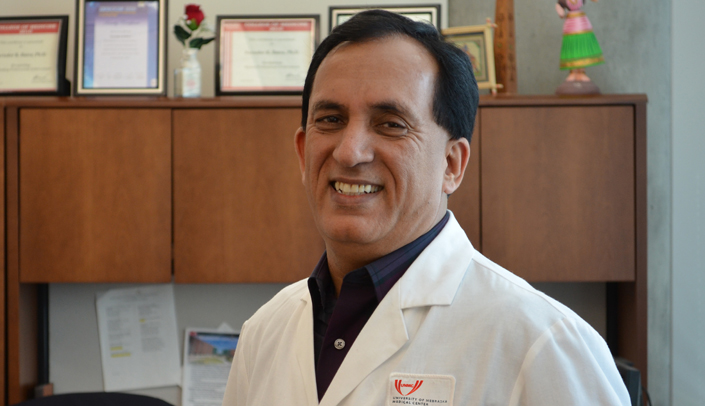A $250,000 grant from the Nebraska Research Initiative will use complex computer simulations to identify top drug candidates that could lead to the next generation of pancreatic and ovarian cancer treatments. Researchers and resources from three university campuses are involved in the project.
Surinder Batra, Ph.D., professor and chairman of UNMC’s Department of Biochemistry and Molecular Biology, is now on the verge of proving the potential of a molecule he originally discovered more than a decade ago — a gene called pancreatic differentiation factor 2, or PD2. New funding will use supercomputer simulations that researchers hope will demonstrate the potential power of PD2 against cancer.
PD2 is involved in the growth of stem cells, but becomes a problem if it gives cancer cells the same set of growth instructions. Cancer cells that express high levels of PD2 act like stem cells, growing tumors that can resist most forms of treatment.
“It has a lot of potential, this molecule,” said Dr. Batra, a two-time UNMC Distinguished Scientist and the 2012 Scientist Laureate. “It is in many cancers, not only pancreatic stem cells.”
Nick Palermo, a computer expert with the University of Nebraska-Lincoln, will try unlocking PD2’s power with the supercomputer at the Peter Kiewit Institute’s Holland Computing Center at the University of Nebraska at Omaha.
Palermo will build a computer model of PD2 and then simulate its interaction with millions of other known molecules. Renowned UNMC drug development researcher and College of Pharmacy professor Jonathan Vennerstrom, Ph.D., also will collaborate on the project.
“In general, the strength of the university is when people from different disciplines can work together,” said James Linder, M.D., interim president of the University of Nebraska.
Grant funding for the PD2 project will also increase the supercomputer’s “horsepower” — an improvement that will benefit future projects. UNeMed, the technology transfer office at UNMC, already has received interest from drug discovery companies that want to collaborate on other new drugs using the same process.
“If this project works,” said Joe Runge, UNeMed’s director of business development, “then we can take discoveries about diseases and translate them to medicines — all within the university system.”
Even if the perfect fit to PD2 doesn’t appear to exist naturally, Palermo can combine elements of the best matches to custom-build potential candidates.
“I think this is a matter of time and effort,” Palermo said, “and we will get it done.”
